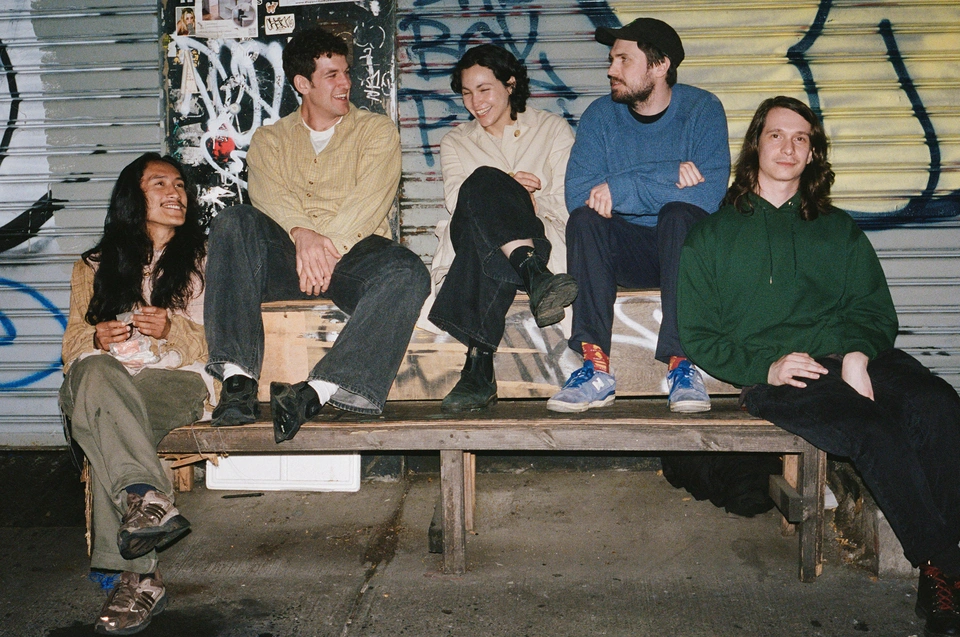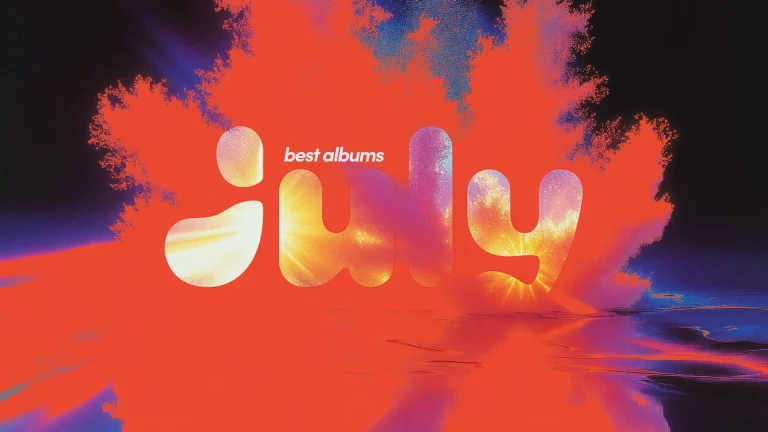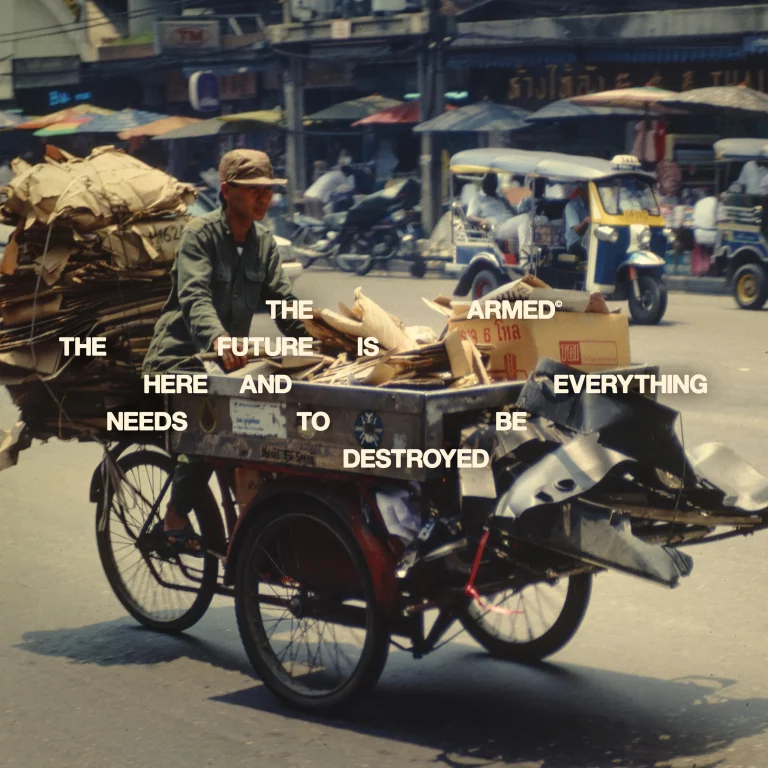“I met you when I was so young/ And you were so young/ And I was so blunt,” Ava Trilling sings on ‘Barnard’, a highlight from Forth Wanderers‘ first album in seven years, making her intentions clear in what might stand as their most anthemic chorus to date: “I want to forgive.” Bluntness may be a marker of youth – Trilling, guitarist/songwriter Ben Guterl, guitarist Duke Greene, bassist Noah Schifrin, and drummer Zach Lorelli came together in high school before landing a deal with Sub Pop – but it doesn’t always translate to open communication. Shortly after the release of their 2018 self-titled album, the band canceled a tour and effectively dissolved, with Trilling opening up about the difficulties of touring after being diagnosed with panic disorder and agoraphobia. Many of us were also so young when we came across Forth Wanderers’ music, and maybe because we had to grow up, too, it was understandable that we might never get new music from them again.
The group spread out in different places, but during the summer of 2021, Guterl and Trilling met up for the first time since the band’s breakup, having one of several conversations that would help them all reconnect as adults. As a rising band, they were charged with the possibility of making their dream their career, but now they were revitalized by the reality that they are all leading independent lives and could make music on their own terms again. Trilling set a clear boundary around touring, which not only made writing lyrics a lot easier, but also gave Guterl and the rest of the boys, along with producer Dan Howard, more freedom to experiment. As dynamic as it is expressive, The Longer This Goes On is a rare product of piled-up emotions and musical growth, inextricable from memories of a youth but so much more inspired in its uncertainty and transience. When it goes, there’s no time to think about the duration; for the album’s half hour, at least, Forth Wanderers sound totally locked in.
We caught up with Forth Wanderers’ Ava Trilling and Ben Guterl to talk about how the Beatles’ Get Back documentary, having no expectations, time, and more inspired The Longer This Goes On.
The Beatles’ Get Back documentary
Ben Guterl: The Peter Jackson doc came out around the time we decided to do this. Me and Noah watched that in our apartment together, and it was incredibly inspiring. I wish I could have the sixty hours of unedited footage that he sifted through to get that shit. Them being a band together and writing an album, I think, kind of inspired us to do it the way we did. Normally in the past, I would kind of write the songs, the two guitar parts, and I would send those to Ava to write the lyrics and vocal melodies, and then we brought that and worked it out with the band. But because we all had our own lives and I was writing stuff for my other project Ben Special, I didn’t feel like I had enough time to write everything. So I was like, if we do this, at least the four boys, we have to write the instrumentals together. And I think that documentary was the thing that solidified that idea and made it appealing. Coming off the pandemic, part of this endeavor was in the nature of reconnecting our friendships, and I really wanted to spend time working on music with Zach and Duke and Ava – Me and Noah live together, so I see him all the time. [laughs] But I think that documentary really had an embarrassing amount to do with why we did it the way we did.
Was there something illuminating or insightful about not just watching the Beatles play and write together, but how they interacted in those in-between moments?
BG: For me, what was so inspiring about it was how normal it all seemed. You really do forget that you were watching The Beatles make music, it looks like anyone making music. What was interesting about this documentary specifically was that it was in such a tense period of The Beatles’ careers, where everyone’s ego was super inflated and they were getting sick of each other. You could see that tension initially and how it sort of dissolved when they started – or not totally dissolved, but how the fun came through even seemingly against their will. The way they would just bring riffs and flesh shit out and just collaborate, I was like, “Oh, this is just like anyone I’ve worked on music with.” They’re all really good at it, obviously, but it just reminded me of working on music with my gang. We’re all friends and we all have had histories and it felt like we were in a similar part of our career – we had been together a while and we had come through some ups and downs.
You realize how the tension is overshadowed, really, by how much fun they’re having goofing around and making music, which goes against the narrative that persisted about recording the album. I’m wondering if there was something about that that resonated with you or reframed how you see the group.
BG: I feel there were these moments of tension when they would enter the studio, but once they started making music, it seemed like a lot of that dissolved. And I think that was sort of how we approached making this record. Not that it was super tense between us – because I feel like with the Beatles, it was more than a tension, it felt like a detachment from the band. Forth Wanderers had been dissolved for many years, so we’d all grown apart from it, and it was more just, “This is a fun thing that we can do, so why not?” It wasn’t like the band was our whole lives; it was just this fun activity we could do together.
Ava Trilling: When you’re at the end of high school, early college, feeling like this band was picking up steam and traction and getting acknowledged – it’s at this point in your life when you’re like, “This could be big. This could be the dream. We could make it.” You’re really impressionable as a kid. Also, it felt like, if we don’t do this, we’ll go off course or whatever. We weren’t super sure of ourselves, and there’s a lot of insecurities at play at that age. And then you have something bigger than yourself, which is the band, and its success and possible promise. It’s sort of like a pressure cooker at that point.
Scheduling time to write
Ava Trilling: I’d never had to really schedule time to sit down, listen to the instrumentals, and push myself to finish the songs. Every time before this album, we had school and things like that, but you’re so much more inspired without a full time career that you’re thinking about or just a crazy schedule. It came so easily before. This time, I really had to search for that inspiration and motivation a little bit. This was a new feeling for me, to really have to schedule time to sit and write this. Just the normal things in your life that change your day-to-day or make you feel something – my five-year relationship, definitely, there’s some emotions from that that were inspiring to this album and was part of the makeup of the lyrics, and just my mental state at the time.
Do you feel like these were things or emotions you were aware of, but just wouldn’t come out if you didn’t have that pressure and discipline to write? Were you surprised by them in any way?
AT: When you’re so busy and oriented on other things in your life and you’re distracted and you’re going from a to b all the time, I wasn’t having moments to pause and reflect and even really check in with myself about how I was feeling. Having to discipline myself to sit and write these songs – not as a chore, but just realistically what needed to happen – it gave me a space and purpose and to figure it out and come back to myself when hearing these instrumentals. I have been listening and writing to Ben’s instrumentals since I was 15 years old; ten years later, I know it sounds sentimental, but it just feels very familiar, and it feels very, “Okay, I know this. This feels natural to me.” I just need to lock in and see what comes out. I didn’t go into this thinking about themes or having these songs prewritten – I just listened to them over and over and over and saw what came out. It served as a vessel for me to emote. I was not surprised at what came out, but probably just relieved, with a sense of some catharsis.
Ben, how did you respond to the way Ava wrote over these instrumentals this time around?
BG: I feel like Ava is always extremely locked in around vocals and melodies and is very talented at creating a catchy and beautiful melody out of something that might be kind of weird or not traditional. So I was always encouraging everyone to just totally forget about the vocals in the writing process; it was just nice to have been able to be confident that Ava was gonna do something cool. When I heard her vocals, it was like, “Yeah, of course. This is Forth Wanderers again.”
No expectations
AT: After breaking up six years later, a lot of us hadn’t really spoken until that point and we didn’t know where each other was at, with those previous tensions or feelings. But we came back to it as adults, and we talked at length, different conversations between different band members, and ultimately reached the same consensus that we just wanted to make new music and try it out and see what happens. You know, leave things in the past. I think we all recognize that we had musical chemistry, and it just worked when we were together. And there was no pressure at that point. No one was expecting anything of us, really. We all were at different points of our lives, we had careers, so it wasn’t that sole thing that “We’re gonna make it, this is gonna be our future.” It was a separate thing — we can put all of that aside and really focus on just the music. If people like it, people like it. If people don’t, people don’t. It’s really for us.
BG: To draw another comparison to Get Back, being in their Apple Studios, that felt like a little sanctuary for them where they could really isolate themselves and express themselves artistically in an uninhibited way. Not that we had ever been super restricted artistically by anyone, but I think just psychologically, doing it without the expectation of being a band, as a surprise and sort of in secrecy, allowed us to let go of our internal expectations. At least when we were writing it, it felt the most when we were in high school since the band began. There’s something nice and pure about it.
Was this feeling immediate?
BG: I feel like we wouldn’t have done it if it didn’t feel like that. When we all got back together, it had been three years at that point, and it felt really natural and good. Again, we didn’t want to be posting on our page being like, “We’re recording another album,” and have people expecting it. We just started doing some GarageBand shit again and slipped back into those old habits.
The Forth Wanderers dynamic
BG: After doing other musical projects since Forth Wanderers, there’s something I appreciated even more about our specific dynamic that works really well. The five of us — we’re a real band. It’s not a solo project. Everyone contributes, and it’s special because we’ve known each other for so long. It’s a dynamic that I, at least, took for granted while we were a band because at the time, I hadn’t been in that many bands. I couldn’t really speak from the experience of, “This band is like this.” I was like, “This is just how bands are.”
Were there new aspects to that dynamic that were exciting? You mentioned writing more organically as a group.
AT: I don’t know about new aspects, but just by trying to write with other people in between breaking up and getting back to writing this album, it just wasn’t organic with other people. It didn’t sound right, wasn’t scratching the itch. Not saying that I wouldn’t be compatible with any other songwriter or band, but that was my experience. Coming back together to write this album reinforced what I had already known, which was that it was really organic and easy and natural to write to and sing with this band. It just flowed. We didn’t have to think about it too much. But new aspects — I think I felt just more comfortable as an adult and having these conversations before that just made me feel more at ease. I think we all came to it with more security and more confidence. Laying down the boundary that I do not want to tour and I’ll only write these songs with the boundary that I really don’t want to perform allowed me to focus on what I wanted to focus on. I felt like I could show up for myself and be like, “This is how I can write songs again.”
Ben, did these boundaries affect how you wrote the instrumentals?
BG: That is the other huge difference for me about this record, was being able to work with my friend, Dan [Howard]. He recorded and produced the record. He recorded all the stuff for my other project, which came about as an outlet to write songs while I was in college away from Forth Wanderers and what I’ve been working on since. It’s developed into more of a co-writing relationship, so we have a really tight collaborative relationship, and it was really exciting for me to be able to combine my two most important creative relationships into one project. It was this thing of, we’re not playing these songs, so he can go crazy in the studio. Me and him really worked hard to rework a lot of what the original demos were for the songs. He was kind of the sixth member of the band, I would say. I think the album is way more produced — in the sense of creative production, not high fidelity — and that was also a fun dynamic to introduce to the band. I think it made the album have a wider dynamic range than we probably usually have on our records, which is something I’m very proud of.
Blues and country
AT: When we were all together and Ben was showing us some new things he was working on and it was this bluesy, country thing, we all got really excited. Not that we wouldn’t be able to do that live or anything, but not having any pressure, we could try out and experiment with new sounds because there was nothing that we needed to stick to or anything. I remember Ben playing a lick of guitar that was just so sick to me and being like, “Oh my god, I can try to write in this new genre.” But it’s also tied in with Forth Wanderers’ traditional sound, and it was really clever to me. I just remember feeling like I can experiment vocally and lyrically with this. There are a few songs in the album that have a twang to them, and I think it works really well.
Ben and Noah’s neighbour
BG: I don’t even think I’ve told Ava or anyone this before, but ‘Honey’ was pretty much locked in, and I had written that song a few years ago back when me and Noah were living at our other spot in Bed Stuy. We had a next door neighbor who was always out on the stoop, and he was really nice to us. He ended up having a heart attack, and he died a few months after we lived there. I wrote that song the night or I found out that he died, and I originally had lyrics for it that were about him, but I never finished it. I had tabled it for many years, and then I sent it to Ava.
AT: You still have the lyrics?
BG: I had lyrics for the first verse, but I was never able to figure out a melody for the B part. It just sat on my computer for a few years, and I was like, “Fuck it, I’ll just give this to Eva.”
It’s wild passing this along without context.
AT: [laughs] Yeah. That’s so funny. I don’t know what I would have done if I had known that, because then I might have felt like this isn’t my song to write or I was doing a disservice to this person. It’s strange to think about what would have happened if I had known that going into writing the song.
BG: I feel like oftentimes I’ll be affected by something and write a song, so there are things I feel like I write songs about. And then I send them to you, and it’s really more about your own recontextualization of it. There’s something on a subconscious level that kind of works about those influences coming together.
Do you have conversations before or in the midst of writing a song?
BG: We never talk while, before, or after writing.
AT: We really don’t talk about lyrics or themes, it’s just kind of unspoken. Maybe the boys talk about it when I’m not there or something like that, but I doubt it.
BG: Nah, yeah. I think the mystery of it is what makes it cool. I would never tell Ava to write about something or be like, “The song’s about this guy, can you make it about this guy?” Everything comes from such a personal place at every step of the way.
AT: We’re like a problematic family that doesn’t talk about their feelings
BG: [laughs] Exactly. We just have to express them in other ways, but it’s like a “don’t ask, don’t tell” policy.
Time apart
There were, however, those early conversations that led to you making music again, which feels bigger than talking about lyrics or arrangements.
AT: Totally. And those and those conversations had never happened before because we were kids, so that was the first time that those conversations really happened. They were difficult and new and strange to navigate, but I think everybody came to those conversations openly and with their guard down. They needed to happen before we could write anything. I think we just all had a bit more compassion probably for where the other person was coming from.
Do you feel like time played a role in that? Not just being adults, but having enough distance to talk to everyone more vulnerably?
ΑΤ: Yeah, that time and distance definitely played a big part in how we felt, healing from certain dynamics or problems in the band. It gives you a new or evolved perspective of what happened.
BG: When the band broke up, I feel like we were all pretty devastated. I was definitely pretty aimless for a bit. I think I needed to move to New York and be able to live on my own and start new projects. COVID did a lot to put things in perspective, and it sped up the getting-over-it process because it just felt so long. By the end of it, it was like, “Why not?”
AT: It doesn’t matter.
BG: Yeah, it was water under the bridge.
AT: After seven years of not having that outlet that I used to have since I was really young – I never really wrote much or in that same way. And then finally being able to do it again, there’s so many things that from the past seven years that just came up. Things that were not relevant to me in that year or the year before, but happened when I was 22 or right after the band broke up. There’s a lot of growing up and experiences that I resorted to writing about in my journal or whatever, but couldn’t really express in that same way that felt really cathartic and fulfilling to me. That was the sole inspiration, for at least my lyrics, was a huge period of time of not being able to express myself in a way that felt so good for me for so long. Like a pit that I can just put at all my experiences and emotions and hurt into.
BG: That’s really interesting because I feel like for me, it’s kinda the opposite where I feel like my inspiration came from the ways in which I feel like I’ve grown as a songwriter from making songs throughout this period. I was really excited to bring all of this experience now into the record. Ava has a very distinct style, so we felt like we could go different places with it because she would always hold it down – the responsibility wasn’t on us to make it sound like Forth Wanderers, really.
Is that something you were conscious of, Ava?
AT: It wasn’t really in my mind when I was writing lyrics or vocal melodies. Even the newer or more experimental instrumentals that I would receive, Ben’s not taking credit for that sounding like Forth Wanderers, but it’s definitely all of the guys. Within the instrumental there is a Forth Wanderers through line; I can’t point tangibly to what it is, but it’s still there. The sound of my voice and the cadence to which I sing is consistent when it comes to writing in general, but the most consistent thing that I’ve ever written for is Fourth Wanderer, so it just sort of is.
This interview has been edited and condensed for clarity and length.
Forth Wanderers’ The Longer This Goes On is out now via Sub Pop.








